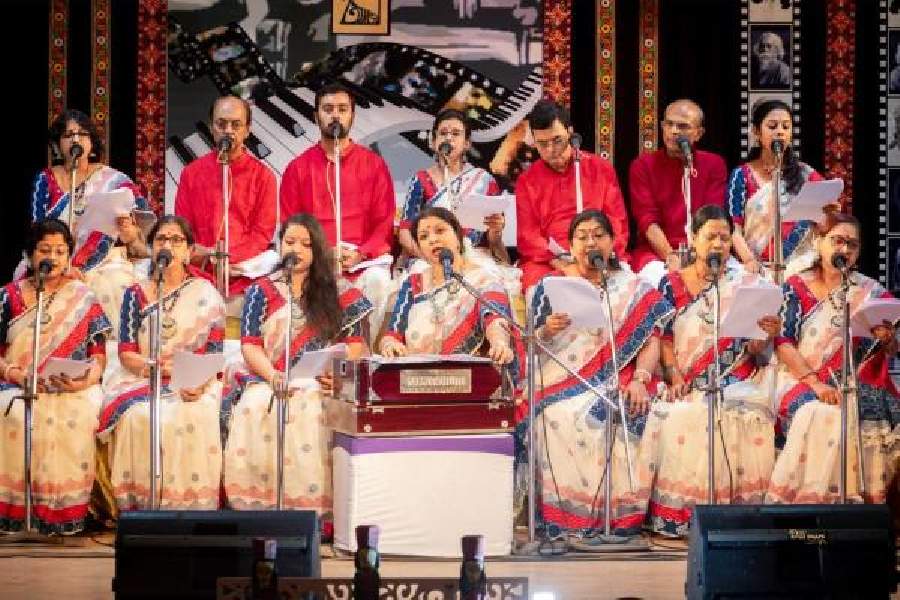Did you know that Bijoya Ray (nee Das), wife of Satyajit Ray, lent her voice to the 1944 film Shesh Raksha? Or that Hemanta Mukhopadhyay’s first Rabindrasangeet on celluloid was for the 1943 film Priyo Bandhabi?
AC Block-based cultural group Abhog, known for its experimental approach to Rabindrasangeet, revealed such trivia during its annual programme at Rabindra Okakura Bhavan. Titled Chalachchitre Rabindrasangeet, it blended narrative and music to showcase Tagore’s songs as featured in Bengali movies.
The show opened with a chorus of Amader jatra holo shuru from the 1949 film Ananya, originally sung by Kanan Devi and Suchitra Mitra. This was followed by a solo rendition of Amar bela je jay from the 1937 film Talkie of Talkies by Moniratna Roy.
The bard never composed specifically for cinema but still over 250 Rabindrasangeets have been featured on the big screen, the performers said.
Swapne amar mone holo from Shesh Raksha, performed by Srijita Sarkar, drew much applause, as did Ami tomay jato from Jibon Maran, sung by Jayati Roy. There were songs from Satyajit Ray’s Kanchenjungha, Jana Aranya, and Ghare Baire. The rendition of Bajilo kahar bina from Agantuk by Smita De received warm applause.
Debjani Sarkar, who led the show, sang the rarely performed Ogo tora ke jabi pare from Chirokumar Sabha (1956). “This theme is quite widely explored, we had to select songs carefully. Some changes were needed, but we stayed true to the spirit of the originals,” she said.
Nupur beje jay from Tarun Majumdar’s Bhalobasar Bari and Badh bhenge dao from Chander Bari were sung in chorus. The solo Charono dhorite dio go amare by Anindya Paul brought back memories of Tapas Pal’s character in Dadar Kirti and Pather sesh kothay from Priyo Bandhabi, performed by Saibal Sen, evoked memories of Hemanta Mukhopadhyay’s early days.
The evening concluded with a touching tribute — a recording of Mone robe kina rabe nirobe in the voice of the late Kanchan Baran Adhikary, the founder of Abhog, to which members joined in chorus.
The show was conceptualised by Sen and scripted by Kanad Chowdhury, who also played the violin. “Rabindrasangeet exponent Swapan Som’s book Chalachitre Rabindranath has been a vital resource for us,” he said. Meanwhile, Som and his wife, singer Debarati Som, watched the show from the audience till the very end.
Anniversary tributes

AA Block residents sing at their Rabindra-Nazrul jayanti Brinda Sarkar
The Rabindra-Nazrul jayanti at AA Block this year saw residents perform out of deep inspiration.
Kalpana Dutta recited Africa, the poem Tagore had written after Benito Mussolini’s invasion of Abyssinia (modern-day Ethiopia) in 1935. “My father-in-law died recently, and my mother-in-law is bedridden. I had every excuse not to participate today, but I thought of how Tagore overcame so many problems in life to create seminal work. I chose Africa as its mood reflects mine at the moment,” Dutta said.
Mehuli Dutta Gupta, who married into the block in 2021, has performed all her dances in the block with her neighbour Saheli Bhattacharya. “This time Saheli is singing and could not take part in the dance. Not to lose heart, I decided to dance to Ekla cholo re,” she smiled.
Kumkum Sen sang both Rabindrasangeet and Nazrulgeeti. “Most residents sing Tagore as his numbers are more common, and because Nazrulgeeti requires a classical base. I learn music from Swagatalakshmi Dasgupta, so I am performing both,” she said confidently.
Debabrata Mondal, a homoeopathy doctor and songwriter, recited from Gitanjali. “Tagore’s thoughts were of the highest order, with a touch of the Upanishads, in every song. And Nazrul’s work was above religion; he wrote on humanity,” he said.
Urmy Palchaudhuri scripted, directed, and sang in an item featuring works by both the bards. The segment also starred Saheli, Swagata Sen, and Kajari Chakraborty, who anchored the show.
“Tagore and Nazrul may seem divergent in their approaches, but they meet somewhere. So we picked up themes and presented songs on them by both poets,” said Palchaudhuri. On love, they sang Tagore’s Amar poran jaha chay and Nazrul’s Tomari akhir moto duto tara. On “parichay”, they chose Tagore’s Ami chini go and Nazrul’s Dur dwipabashini.
The kids charmed the audience too. Six-year-old Aayansh Sil mistakenly described both his songs — Projapoti and Aay tobe sohochori — as Nazrulgeeti, prompting laughter and a rush of hugs from the audience as he left the stage. Everyone asked his parents to ensure the budding talent keeps singing.
“I listen to Tagore and Nazrul music daily with my morning tea and before I go to bed,” said block president Arunabha Majumdar. “And I know this is the case for many of us. I thank residents for coming to participate today.”











